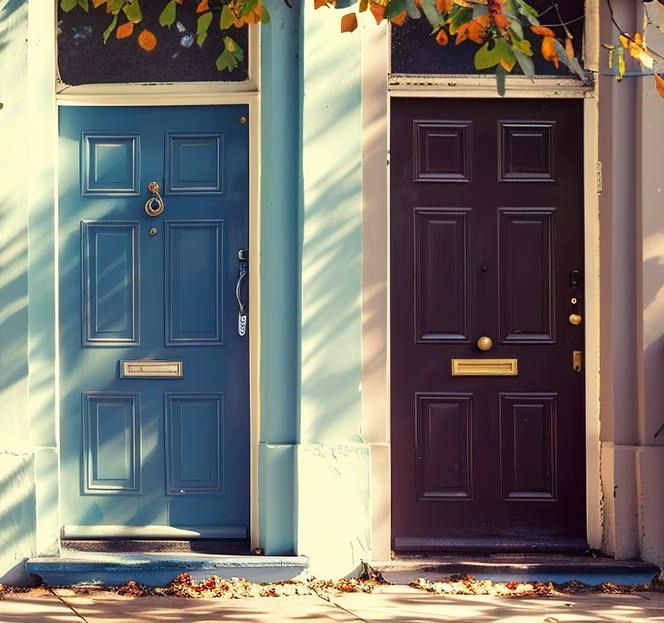Second-home ownership has soared by more than 50% since 2001, with an estimated 5.5 million people owning a second home in the UK or a property overseas.
So, what is driving this surge in buying a second home?
Since 2020 the second home market has seen unprecedented growth. With dreams of escaping to the countryside or the seaside and the increase in remote working, there has never been a better time to invest in a second home.
However, is it just as easy as finding the second home of your dreams and making an offer?
Second home mortgages
Why do you want a second home in the UK?
There is no denying that second-home ownership has soared in the past 20 years for a number of different reasons, but ultimately, you need to determine why you want to invest in a second property.
Some of the reasons why you might be thinking about purchasing a second home include:
- As a rural retreat for weekends
- To own a holiday home in your favourite UK holiday destination
- To put your savings to good use
- To invest in a home or asset for your children or elderly parents
- As a crash pad in the city for work purposes

What you need to know before buying a second home
Although we will go into each of the below factors in more detail further down in the guide, before you start to look for a second home, you need to know the below:
- The Stamp Duty costs will be higher.
- If you plan to take out a mortgage, you will need a healthy deposit.
- If you have an existing mortgage, you will need to meet strict affordability criteria before you are accepted.
- Your mortgage rates may be higher than with your main home.
- If you choose to sell your second home, you may have to pay capital gains tax.
All of the above being said, there are so many benefits to buying a second home, such as:
- Property is (mostly) always a good investment
- It’s a good strategy for retirement
- There are tax benefits
- An improved lifestyle and work/life balance
Therefore, if you have your heart set on buying a second home, either for financial reasons or for pleasure, don’t let the small details put you off, as these can all be ironed out during the buying process.
Where to buy a second home in the UK?
Of course, where you choose to buy your second home is completely up to you.
You may envision a holiday cottage in the middle of the countryside, or perhaps you favour the excitement of a seaside town? You may also have a particular location in mind because you want to have a base close to other family members that don’t reside near you.
According to the English Housing Survey the top 3 areas for second home ownership are:
South West
27% of second homes are located in the South West
South East
14% of second homes are located in the South East
London
12% of second homes are located in London
ESCAPING FROM THE CITY
If you live in or around London, you may be keen to purchase a second home away from the capital. Kent is a particularly popular option, with the seaside towns of Margate and Broadstairs both offering a combination of seaside charm and exciting café culture.
The Suffolk Coast and Heaths is also a great choice as it has fast train connections to London and offers breathtaking landscapes.
HEADING TO THE COAST
The UK is blessed with a huge coastline which means you can easily achieve your dream of owning a home by the sea. As you would guess, Cornwall tops the list of UK summer holiday destinations and is also a very popular choice for second home ownership.
Devon is just as sought-after, with Salcombe voted the UK’s favourite coastal town last year, and Torquay is another great area with an excellent selection of local restaurants.
CHILLING IN THE COUNTRYSIDE
Who doesn’t dream of owning a countryside retreat? Whether you head to the Cotswolds and look for a quintessential English cottage or you prefer a rural town such as St Albans in Hertfordshire, there are so many amazing locations in the UK where you can enjoy the countryside.
REASONS FOR HAVING A SECOND HOME
45%
Holiday home or weekend cottage
35%
Long term investment or income
7%
Previously main home
13%
Other
9%
Future retirement home
4%
For working away from home
8%
Someone living away from home
0%
Marital breakdown
QUESTIONS?
Please call us on
020 8301 7930
What are the costs of buying a second home in the UK?
As with most things in life, the decision of whether to buy a second home or not will most likely come down to how much it will cost and if you can afford it.
If you are concerned that you may not be able to afford a second home in the UK, then the below information should be able to help you.
There are several financial aspects of buying a second home that you need to know about, and these are as follows:
STAMP DUTY
When you buy a second home, the stamp duty is more expensive than if you were buying your first home. Once you own your main home any additional properties have a stamp duty surcharge of 3% on top of the normal tax bands.
BILLS
Often forgotten about, even though you may not be living in your second home all year-round, you will still have to have sufficient funds to cover the bills.
These may include:
- Insurance
- Energy bills
- Telephone/Broadband
- Council tax – some councils offer discounted council tax for second homes.
- Any maintenance costs

How to get a mortgage for a second home
As the name suggests, a second home mortgage is designed for people who are looking to purchase a second home.
These types of mortgages are not always that different from mortgages for main residencies, but what you are able to get will depend on a few key factors.
For the purpose of this guide, we are looking at second home mortgages for people who are not looking to rent out their second home but simply want to enjoy it with their family and friends.
Firstly, a lender will want to make sure that you can afford both your current mortgage repayments (if you still have any) and the payments for your new mortgage. This usually results in you needing a larger deposit than you would need for a first home – typically around 15-20% of the property’s value.
Proof of income will always be required via P60, payslips, accounts or SA302 Tax Calculations
You will also need to have a good credit score. The better your credit score, the more likely you will be to get the best terms for a second property mortgage.
Lenders will also look at your current income to judge whether or not you can afford to take out a second mortgage. If you have a steady income, you can typically overcome any other barriers that may be holding you back from being approved. For those that have a high income, you should always prioritise paying off any existing debts before you take on the new debt of a second mortgage.
That being said, if you have a good income, you may still be accepted even if you have some unpaid debts as long as you can prove that you can comfortably make the repayments.
How many residential mortgages can you have?
There is no actual limit on the number of residential mortgages that you can have in the UK, although lenders are wary of people using them to buy properties to rent out. This means that most lenders will only allow a maximum of two residential mortgages – one for your main residence and one for your holiday home.
When you take out a second home residential mortgage, you will have to declare which one of your homes you intend to be your primary residence.
You will also need to provide a reason why you are buying a second home, such as for holidays or as a result of a divorce. Basically, lenders need to make sure that you are taking out a second mortgage for a residential property, not to earn rental income from what is really a buy to let.
Can you get a joint mortgage for a second home?
Yes, you can. Most second mortgage products are available to more than one person, so you should be able to apply for a joint second mortgage.
Whether you want to take out a mortgage with the person you plan to share your second home with or an investment partner who wants to buy the property with you, the type of mortgage you need will not change; there will simply be more people involved.
In this case, you would apply for a joint residential mortgage. It is worth noting that most lenders will only offer joint mortgages for second homes to two people, although you can find some that will allow up to four.
Can I release equity in my home to buy a second home?
If you are over the age of 55, you may be able to release equity from your main residence to buy a second home. You can choose to take the money out in full or in a few smaller amounts.
The most common equity release scheme is called a “lifetime mortgage,” and this involves the interest on the lump sum of the mortgage to build up over time. It will then be repaid when the borrower goes into long-term care or passes away.
Am I eligible for a second home mortgage?
If you can afford the monthly repayments, meet the minimum deposit, and you have a good track record with provable income, you should be able to get a holiday home mortgage.
While some lenders will have stricter criteria when it comes to lending for a second home, this doesn’t mean you won’t be able to get a good rate.
Can I re-mortgage to buy a second home?
If you have sufficient equity in your first home, you may be able to re-mortgage it to raise funds to buy a second home. That being said, lenders will still want to feel confident that you can afford the monthly repayments.
You should also be aware that if you miss any payments on your holiday cottage mortgage, your main home could be put at risk.
Can I get a second home mortgage if I am older?
If you are worried that your age will go against you when it comes to taking out a holiday cottage mortgage, you don’t need to be.
There is currently no official age limit for getting a second mortgage. However, you should know that some mortgage lenders do set their own age limits.
Furthermore, even if you are below the maximum age for a mortgage with a particular lender, they are likely to use how old you are to determine the duration of your mortgage. For example, if you are 65 years old and you want a second home mortgage, you are likely to have to prove you can repay it within 10 years rather than 30-35 years.
Although this may not be a problem if the mortgage is interest-only, if it is a repayment, then a short-term mortgage will increase your monthly payments considerably.
As with anyone taking out a second mortgage, you need to be confident that you can make the monthly repayments, and you need to be able to prove this to your lender.
Are there any additional requirements that lenders have for second home mortgages?
In addition to whether or not you can afford to pay for a mortgage on a second property, most lenders will also stipulate the below requirements:
- You will need a lower LTV. Most lenders will look at both the loan to value on your current residence and the one you are looking to purchase before making a decision.
- Your credit history will need to be good. With holiday homes, you will find there are fewer lenders offering mortgages at higher LTVs, which means that bad credit could affect your ability to be approved. This is especially true if you do not have a large deposit to put down.
- The distance between your main residence and second home. With a holiday cottage in the UK, lenders make query how far away it is from your main residence as most people live within a few hours of travelling.
- Why you are buying a second home. You may need to make a strong case as to why you are buying another home. Your lender may even ask for proof that you are still living in your main residence once you have purchased your second home.
WHAT ARE THE OPTIONS IF I WISH TO LET OUT THE PROPERTY?
All of the information in this guide is for a property that you will only use for yourself and your family.
Should you wish to let the property to earn an extra income then different mortgages will be needed depending on the style of let. We have lots more information on these on our site:
- Buy to let – You will need a buy to let mortgage if you wish to have long term tenants paying rent.
- Holiday let – You will need a holiday let mortgage if you intend only offering short term lets to holidaymakers, this will include Airbnb.
Second home mortgages
What is the capital gains tax on second homes?
Capital Gains Tax (CGT) is the tax you need to pay on any profit you make from selling a property that is not your main residence.
This means that if you ever decide to sell your second home in the future, you will most likely need to pay capital gains tax.
You may also be liable to capital gains tax if you gift or transfer your second home to someone else or exchange it for another asset.

Fortunately, there is an annual capital gains tax allowance that you can take advantage of. If you are a couple who jointly own your second home, you can combine this allowance.
However, the allowance is per tax year and cannot be carried over, so if you don’t use your allowance in a particular tax year, you will lose it.
How to calculate capital gains tax liability
You should know that you only pay capital gains tax on any profit you make from selling your second home, not on the entire sales value of the property. You are also allowed to deduct certain expenses from your gain to reduce the amount of tax you have to pay, such as estate agents fees, lawyers fees, and any work carried out on the property to improve it.
The below simple formula can help you to work out the amount of capital gains tax you have to pay:
Gains = Purchase Price – (Sale Price + Buying and Selling Costs + Improvement Costs)
Don’t forget to also deduct your annual capital gains tax allowance from your figure.
If you have any problems working out the amount of capital gains tax that you need to pay when selling your second home, the UK government has created a handy online calculator tool to help you.

What are the pros and cons of buying a second home in the UK?
If you are still not sure if buying a holiday home in the UK is the right choice for you and your family, then the below pros and cons list should be able to help you.
PROS
- Your second home can act as your holiday home, as well as a place which other family members and close friends can use also.
- A second home should rise in value at some point, and you will hopefully see a good return on your investment.
- You can always sell your second home if you need the money or you change your mind about second home ownership.
- Your second home could be your retirement home.
- You can leave your second home to your children and help them to get their first foot on the property ladder.
CONS
- Lenders can be strict when it comes to lending enough money for a new mortgage.
- The stamp duty charge is fairly high.
- You have to pay for any running costs even though the property may be empty.
CONCLUSION
While there is a lot to consider before buying a second holiday cottage in the UK, as long as you do all your homework and know exactly what you are getting yourself into before you sign on the dotted line, there is no reason why the process shouldn’t be straightforward and stress-free.
Whether you are looking for a second home to use as a holiday home or you simply want to put your savings into property, the right mortgage broker can help you make the most out of your money and purchase the second home of your dreams.
Here at Drake Mortgages, a leading independent mortgage broker, we have 25 years of experience in the business and can help you to get the best mortgage rate for your second home.
Get in touch with our knowledgeable and friendly team here today, and let us search the whole market to find the best deal for you.
